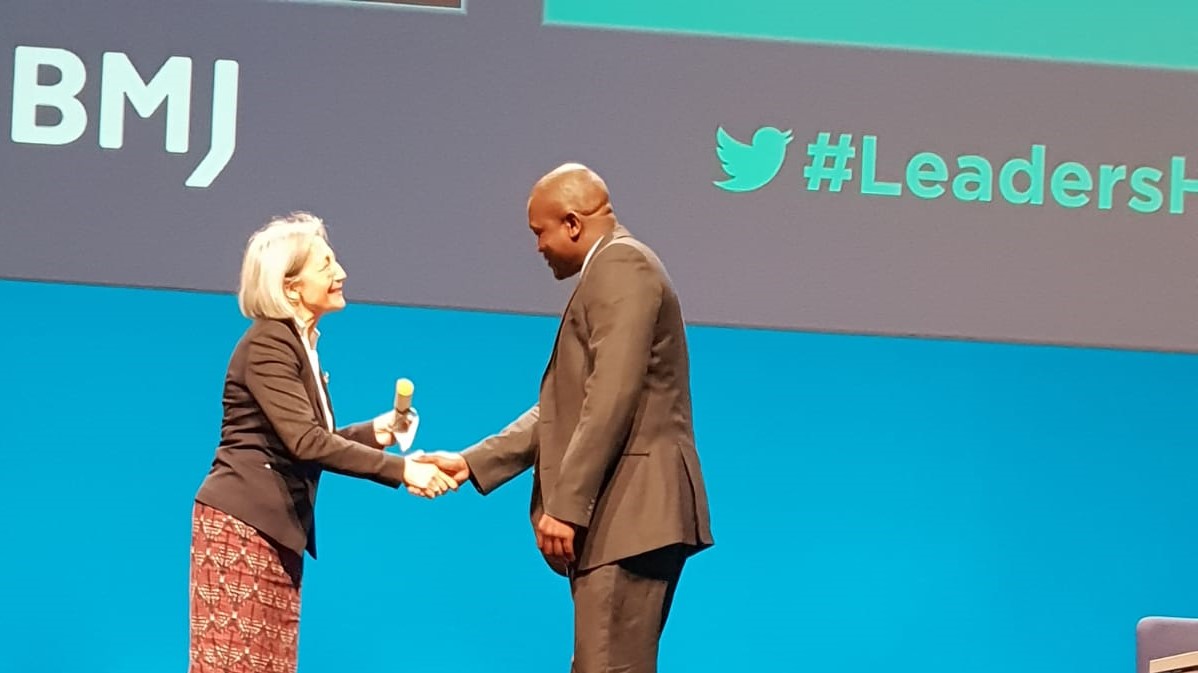By Dr. Brighton Chireka
DOCBEECEE shaping the Clinical Leadership
Is leadership over rated or is it true that success or failure of any initiative, service, business, system and organisation is down to the quality of its leadership? A lot has been written about leadership with an on-going debate on whether leaders are born or trained – the age old nature versus nature debate. In this blog I will share with you some of my personal experiences on leadership development, my views on how leaders should be developed as well as what I am doing about it.
Come with me to 1995, there I was as a medical student doing my third year. It was my first time to be on a ward round with a consultant. I was asked a question which I had no clue about. The feedback that I got was traumatic as I was scolded by my new consultant. I wished there was a hole that would swallow me as the humiliation was unbearable. To my surprise everyone around me was laughing not seeing how traumatic this incident was to me.
After the ward round everyone came to me and told me not to mind the behaviour of that consultant. I was told that he was always like that with everyone. Yes I later found out that he was rude and authoritative to everyone in his firm. No one could speak up to him. He silenced everyone. His word was final and he was always right even if he got some things wrong he never admitted his mistakes. He would shout at nurses , fellow doctors and medical students in front of patients. He was not compassionate to patients and was oblivious of their presence when he starts to explain their medical conditions to us. There was a culture of fear and no one dare speak up. Sadly we all accepted his behaviour and this toxic culture as the norm. We sadly found ourselves copying his style of leadership. We found ourselves treating each other in the same manner we were being treated by our consultant. No one taught us how to work as team , resolve misunderstandings or give feedback constructively. We learnt how to blame each other and argue over nothing or littles things and try to outdo one another. It was about me only and not the team and in all this the patient was forgotten.
Initially I thought every consultant in the medical field was like my first consultant but as I progressed with my career I later on realised that they were compassionate and caring consultant who value and respect their colleagues and their trainees. The culture in their firm was very different. It was an open , learning and no blame but restorative culture. One would speak up and their contribution was invited ,expected , valued and considered in decision making. One would feel free to admit their mistakes and learn from them.
As I progressed in my career as a medical doctor I noticed the lack of effective clinical leadership among fellow clinicians. It was painful to see a great surgeon failing to have the desired impact due to lack of interpersonal skills . The way they related with colleagues and patients resulted in conflicts and complaints. These clinicians lacked the leadership skills and I do not blame them as their training did not include clinical leadership. They were expected to just acquire leadership miraculous without proper training or leadership development plan. They were just thrust into the deep end of leadership without the necessary skills , induction or developmental package. They did not ask for a development package as they did not know what they did not know. Their employers did not have a plan to help these consultants acquire and develop leadership skills.
The leadership gap has been identified by many health systems and they are now paying attention to the development of clinical leaders. The National Health Service ( NHS) is one of the health system that has taken clinical leadership to another level. In the United Kingdom, we have the Faculty of Medical Leadership and Management (FMLM) which was formed in 2012. I am a proud founding Fellow of the faculty of Medical leadership and Management. We also have the NHS leadership academy whose role is to develop leaders, celebrate and sharing where outstanding leadership makes a real difference. I did my training with them in 2015 and acquired the Nye Bevan NHS Leadership Academy Award in Executive Healthcare Leadership.
The FMLM has now come up with the leadership curriculum for medical schools. The ‘catch them young approach’ is the right way in transforming clinical leadership so that my initial experience of toxic leadership should be a thing of the past. It should be made clear that those bullying tactics are unacceptable in medicine. Registration boards have also realised the need for clinical leadership . In the UK the general Medical Council (GMC) has expectations around clinical leadership . The King’s Fund, a policy think tank in the UK, has written several papers on the importance of clinical leadership (West et al., 2015). Prof Michael West is another guru in compassionate leadership having written extensively on that subject( West et al., 2017).
Having been through the clinical leadership journey myself and seen the benefits, I would like to play my part in sharing this knowledge. My vision is to equip every clinician with the knowledge, skills and approaches to clinical leadership. I strongly believe that with the right support, training and advice our clinicians and healthcare workers can do a lot to improve patient care, patient experience, lead successful health systems and ultimately improve the public’s health. Covid-19 has reminded us once again of the importance of leadership in a crises as well as the need for leadership when we eventually come out of this crisis. At DocBeeCee we have the ambition of supporting as many health and care workers as possible to reach their potential and to strengthen health systems. We have exciting programmes that range from individual through to system level leadership development and support. Our programmes are built on many years of experience as leaders in different parts of the health system as well as running leadership development programmes for a number of UK universities and supporting a wide range of colleagues and customers.
We have successfully run leadership programmes as a site for the University of Washington. This oversubscribed course confirmed our intuitive thoughts on the gap that exists in leadership development across health and care systems. The participants from the programme reported thoroughly enjoying the course and constantly asked us for follow up sessions. This programme was attended by a cross section of clinical and non-clinical colleagues at different levels of seniority including some national programme leads in some of the countries. We value the course by the University of Washington and we use it as the foundation to any leadership development. The programme gives a basic understanding and acquisition of essential skills in medical leadership.
If you are interested in the University of Washington Leadership and Management in Health, please click the following link for further information https://docbeecee.co.uk/applications/
So to finish where I started, is leadership overrated? It is my view that leadership is a critical requirement for personal, family, community, team, service, organisation and business success. Without effective leadership the true potential is never reached. I strongly believe leadership has a wide range of skills, knowledge and experience which require training, support, guidance and advice. Blanchard, Hodges and Hendry (2016 ), see leadership as a journey that begins with personal transformation and progresses to one leading another person , then one leads a small group of people before moving to lead an organisation.
Swanwick and Mckimn (2011) argue that leadership is necessary at every level. Therefore leadership development must be provided throughout the education and training of health professionals.
I am looking forward to DocBeeCee doing its part in developing and growing leaders to improve patient care and the public’s health. I hope you get in touch with us to discuss this and more!
For more information emails us at admin@docbeecee.co.uk
References
Blanchard, K., Hodges, P. and Hendry, P. ( 2016 ) Leading like Jesus. Nashville, Tennessee: W Publishing Group
Swanwick, T and McKimm, J. ( 2011). What is clinical leadership and why is it important? The Clinical Teacher 8, 22-26 https://qi.elft.nhs.uk/wp-content/uploads/2017/07/Swanwick_et_al-2011-The_Clinical_Teacher.pdf (accessed on 21 July 2021)
West, M., Eckert, R., Collins, B. and Chowla, R. (2017) Caring to change. How compassionate leadership can stimulate innovation in health care. Kings Fund, London. http://tinyurl.com/lfykfl2
West, M., Armit, K., Loewenthal, L., Eckert, R., West, T. and Lee, A. (2015) Leadership and Leadership Development in Healthcare: The Evidence Base. London, Faculty of Medical Leadership and Management https://www.kingsfund.org.uk/sites/default/files/field/field_publication_file/leadership-leadership-development-health-care-feb-2015.pdf (accessed on 21July 2021)
![]()




